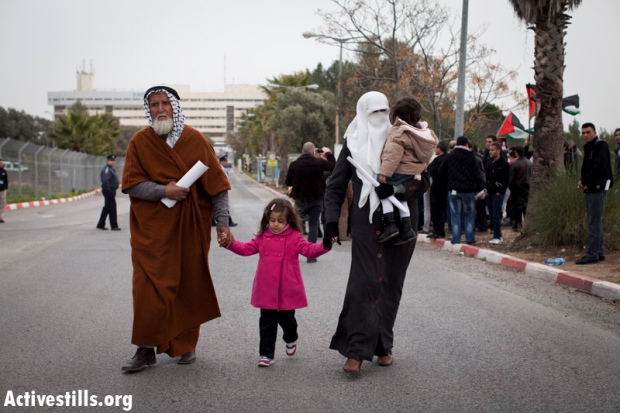As he enters his 50th day of hunger strike, Palestinian prisoner Khader Adnan’s health is rapidly deteriorating rapidly. Now it seems like the Israeli government may try to negotiate his release from administrative detention.
By Yael Marom and Noam Rotem

Palestinian prisoner Khader Adnan’s health deteriorated significantly Wednesday as he reached his 49th day of hunger strike. According to Attorney Jawad Bulus, who is the only person aside from members of the Israel Prison Service (IPS) to have access to his hospital room, Adnan’s health is deteriorating from day to day.
Since the beginning of Adnan’s hunger strike, which he launched in May to protest the extension of his administrative detention, Adnan has lost 70 pounds, his eyes have yellowed — a sign of liver failure — and his urine has turned a murky brown, which is often a sign of kidney problems. He has purple marks around his body, and on Tuesday night he began to bleed and vomit uncontrollably.
This is the second time Adnan has gone on hunger strike to protest his administrative detention, a process in which prisoners remain in detention without having seen trial or been officially sentenced. The first hunger strike was in 2012, when he demanded that he either be released from indefinite detention or sentenced. Adnan went on hunger strike for 66 days, which came to an end after the state finally agreed to release him.
Adnan was detained once again in 2014 while passing through a checkpoint near Nablus during Operation Brother’s Keeper, and was placed in administrative detention. On May 6, 2015, a short while after his detention was extended for the third straight time, Adnan announced that he would go on another hunger strike. According to the army, intelligence gathered on the detainee shows he has direct ties to Islamic Jihad. The intelligence, however, has not led to an official indictment.
Beyond Adnan’s external symptoms, it is impossible to know the full extent of the damage caused by his hunger strike, since he refuses to be examined by doctors in the internal medicine department at Assaf HaRofeh Hospital while in handcuffs. The guards will not uncuff him, even at the expense of his health.
Only upon the arrival of Dr. Leonid Edelman, who heads the Israel Medical Association, did the guards — two of whom are keeping watch over Adnan — to uncuff him for the duration of the meeting.
When Adnan’s health began greatly deteriorating toward the end of last week, officials from the IPS brought jailed Islamic Jihad leaders Ziad Basisi and Firas Sawafta to the hospital to visit Adnan. According to reports in the Palestinian media, they were present in the room during Edelman’s visit, who unequivocally told the doctors to work according to the laws of medicine, rather than the laws of the state.
Physicians for Human Rights – Israel (PHR-IL) also announced on Tuesday that Adnan’s life is in danger. The organization stated that “in addition to his abstention from food and additives, Adnan refuses to undergo medical examination or receive any treatment. Adnan’s condition deteriorated significantly during a visit Tuesday by PHR-IL Attorney Samer Saman. Physicians for Human Rights – Israel is concerned that any additional deterioration could lead to his death.”

Adnan is using the well-known “Irish hunger strike” technique, in which he only drinks water and refuses to accept minerals (including salt) or vitamins. According to the medical literature, a water-dependent hunger strike of over 42 days will lead to life-threatening complications.
The road to negotiations?
This past week, two Palestinian prisoners ended their strike after reaching a deal with the IPS. Ayman Sharbati was released from solitary confinement and was allowed visitors, while Shirin Issawi, who was also released from solitary confinement, was able to receive clothing from outside of the prison and was allowed visits from close family members.
Negotiations with Adnan began only in the last few days. His demand is simply: either be sentenced or be released. It turns out that the position of the state is a bit more complex. In a press conference in Ramallah, Palestinian Authority Minister for Prisoners’ Affairs Issa Karake claimed that the Shin Bet made the decision to kill Adnan.
Radio silence from the PA
Until today, almost 50 days after he began his hunger strike, and despite a hugely popular campaign in 2012, not a single member of the Palestinian Authority of Fatah has made an official statement on Adnan’s current hunger strike. While Hamas members did hold a number of small protests in Gaza, the party has done very little to release him. Adnan is a popular person say his family members, which is precisely why the PA is afraid of him.
Islamic Jihad, the movement from which Adnan hails, released a statement which laid the blame on Israel for Adnan’s fate, stating that Israel has a week to find a solution, and that if he dies, the settlements and the settlers will pay a very heavy price.

And in Israel? Only a single member of Knesset, Osama Sa’adi (Joint List) has visited Adnan in his hospital room. On Monday, Joint List MK Dov Khenin sent an urgent letter to the prime minister, the defense minister and minister of public security, demanding Adnan be released immediately, and asked the IPS for permission to visit him. The Joint List took part in a small protest outside the hospital, while MKs from other parties have decided to ignore the issue altogether.
Both branches of the Islamic Movement also expressed their unconditional support for Adnan’s struggle by holding a mass prayer outside the hospital last Friday (Sheikh Raed Salah visited the family in their village near Jenin). Additional protests organized by Abna’a al-Balad and A’adab Ajal al-Asra also took place in Haifa, Acre and Arara, among other places.
Yael Marom is Just Vision’s public engagement manager in Israel and a co-editor of our Hebrew sister-site, Local Call. Noam Rotem is an Israeli activist, high-tech executive and author of the blog o139.org, subtitled “Godwin doesn’t live here any more.” This article was first published in Hebrew on Local Call. Read it here.

